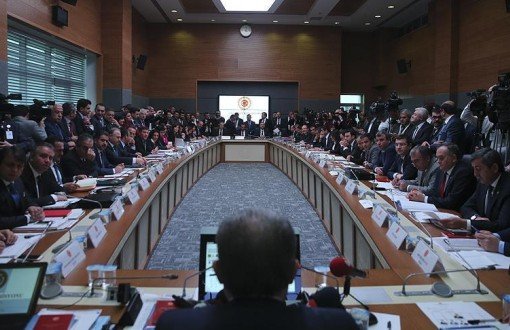Click to read the article in Turkish/Kurdish
The Constitutional Commission of the Grand National Assembly of Turkey (TBMM) has passed the constitutional amendment draft.
The Justice and Development Party (AKP) had submitted the constitutional amendment draft with 316 signatures on December 10, 2016.
The Commission had initiated the negotiations on December 20 and the following nine days had passed amid quarrel and brawl.
The draft, which initially consisted of 21 articles when submitted to the commission, was reduced to 18 articles with motions.
Deadline for statement from opposition is January 2
The President of the Constitutional Commission Mustafa Şentop has set the deadline for the opposition to submit their dissenting opinion as Monday, January 2, 2017, 4 p.m.
330 votes needed for approval
In order to hold a referendum on the amendment draft, the draft first needs to be passed by the TBMM Constitutional Commission and consequently be approved by 330 votes in the General Assembly of the Parliament.
What does the draft suggest?
The number of the deputies will be raised from 550 to 600.
The age limit for deputies will be pulled down to 18 from 25.
The elections will be held in every five years. The Presidential Election will be made on the same day.
The President of the State
The regulation which required that the president was obliged to end her/his relation with her/his political party has been lifted.
The President also obtains executive power.
There will be no ministerial cabinet
The President will appoint and discharge the vice presidents and the ministers.
The authority to issue statutory decrees
The President will be able to issue presidential statutory decrees regarding issues which are covered by her/his executive powers. The fundamental rights and freedoms, as well as political rights and liberties will be left out of the scope of the regulation through statutory decrees.
The supervisory power of the Parliament
Judiciary body’s power to supervise the executive power and to grant the cabinet the authority to issue statutory decrees have been lifted.
The election of the President
The President will be elected for a period of five years. A person cannot be elected President more than twice.
The power to declare State of Emergency
The President will obtain the authority to declare State of Emergency. The State of Emergency will not be in effect for more than six months. The State of Emergency will be published in the Official Gazette on the same day, on which it was declared and will be submitted to the Grand National Assembly for approval.
Investigation into the President
Claiming that she/he has committed a crime, launching an investigation into the President can be requested with a motion issued by a simple majority of votes in the Parliament.
The regulations in the judiciary
There will be no martial courts accept disciplinary courts. Only in state of war, establishing martial courts will be allowed which will cover crimes committed by military personnel regarding their service.
The structure of Supreme Board of Judges and Prosecutors
The name of the Supreme Board of Judges and Prosecutors will be changed as the Board of Judges and Prosecutors. The board will have 13 members.
The Constitutional Court
The number of members of the Constitutional Court will be reduced to 15 from 17. The Constitutional Court will have the power to revoke a law or a statutory decree issued by the President entirely or partly but will not have the authority to pass a judgement which would lead to implementing a new a regulation. (NV/DG)











